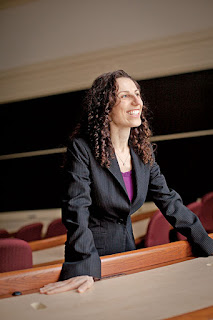 |
| Francesca Gino |
This is certainly ironic. A popular researcher at Harvard Business School who has published numerous behavioral studies on the topic of honesty has been accused of faking her data. Here’s a bit of her bio from Harvard’s website:Francesca Gino is an award-winning researcher who focuses on why people make the decisions they do at work, and how leaders and employees have more productive, creative and fulfilling lives…So Professor Gino isn’t just a popular academic, she’s an academic whose work has crossed over into newspapers quite often. I was only able to find one example at the NY Times but there are about a dozen stories mentioning her at the Washington Post over the past decade. But over the past two years, several examples of Gino’s work have been called into question.
Gino has been honored as one of the world’s Top 40 Business Professors under 40 and one of the world’s 50 most influential management thinkers by Thinkers 50. Professor Gino has won numerous awards for her teaching, including the HBS Faculty Award by Harvard Business School’s MBA Class of 2015, and for her research, including the 2013 Cummings Scholarly Achievement Award, from the Academy of Management Organizational Behavior Division. Her studies have also been featured in The Economist, The New York Times, Newsweek, Scientific American, Psychology Today, and The Wall Street Journal, and her work has been discussed on National Public Radio and CBS Radio.Questions about her work surfaced in an article on June 16 in The Chronicle of Higher Education about a 2012 paper written by Dr. Gino and four colleagues. One of Dr. Gino’s co-authors — Max H. Bazerman, also of Harvard Business School — told The Chronicle that the university had informed him that a study overseen by Dr. Gino for the paper appeared to include fabricated results.Much of the scrutiny of Dr. Gino’s work is coming from three behavioral scientists who run a blog called DataColada. They started looking into her work back in 2021 and found evidence of fraud in multiple papers.
The 2012 paper reported that asking people who fill out tax or insurance documents to attest to the truth of their responses at the top of the document rather than at the bottom significantly increased the accuracy of the information they provided. The paper has been cited hundreds of times by other scholars, but more recent work had cast serious doubt on its findings.In 2021, we and a team of anonymous researchers examined a number of studies co-authored by Gino, because we had concerns that they contained fraudulent data. We discovered evidence of fraud in papers spanning over a decade, including papers published quite recently (in 2020).If you continue reading that blog post it’s a pretty convincing argument that data has been manipulated by changing a small amount of information in an Excel spreadsheet. The same bloggers have published three posts so far alleging data manipulation is various papers and they say they have one more installment to go.
In the Fall of 2021, we shared our concerns with Harvard Business School (HBS). Specifically, we wrote a report about four studies for which we had accumulated the strongest evidence of fraud. We believe that many more Gino-authored papers contain fake data. Perhaps dozens.
Dr. Gino has been placed on administrative leave. The website doesn’t explain exactly when or why but the leave apparently happened in the past month just as her work was being publicly questioned. She wouldn’t comment for the story.
The motive to cheat is strong; articles that "confirm" a popular idea are far more likely to get published, while studies that support the 'null hypothesis' (most studies) are not likely to get published. And getting published is how you advance in science. It might only take a minor change in a few data points to change a study from not significant to significant. And the the likelihood of somebody bothering to check (even if they could) is small. Most scientists are too busy writing their own proposals and doing their own work to check too hard on yours. Given that, a certain level of fraud is inevitable. Only strict sanctions (firing and being unable to work in the field again) will keep it down to a bare minimum.
No comments:
Post a Comment